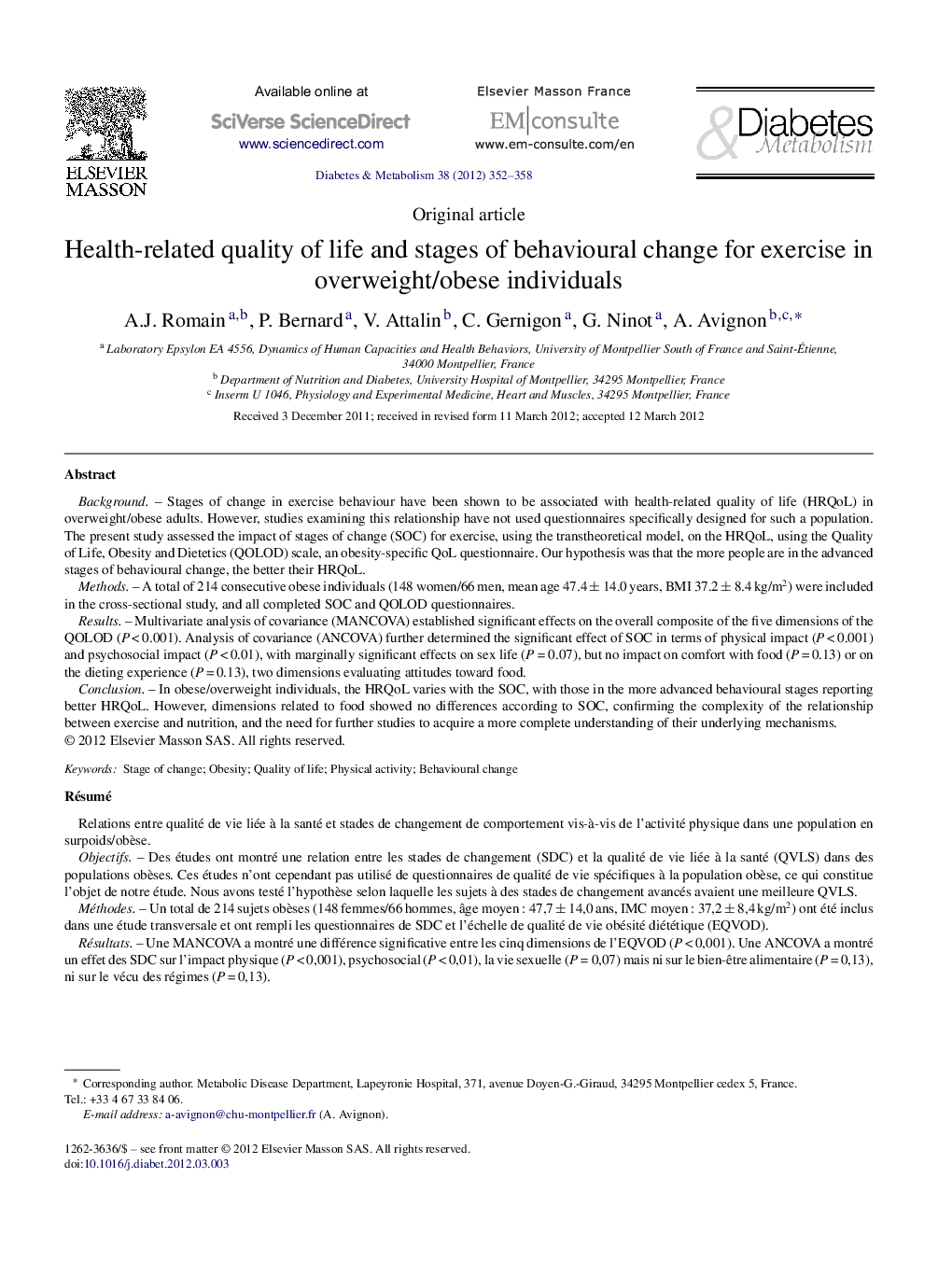| کد مقاله | کد نشریه | سال انتشار | مقاله انگلیسی | نسخه تمام متن |
|---|---|---|---|---|
| 3259643 | 1207582 | 2012 | 7 صفحه PDF | دانلود رایگان |

BackgroundStages of change in exercise behaviour have been shown to be associated with health-related quality of life (HRQoL) in overweight/obese adults. However, studies examining this relationship have not used questionnaires specifically designed for such a population. The present study assessed the impact of stages of change (SOC) for exercise, using the transtheoretical model, on the HRQoL, using the Quality of Life, Obesity and Dietetics (QOLOD) scale, an obesity-specific QoL questionnaire. Our hypothesis was that the more people are in the advanced stages of behavioural change, the better their HRQoL.MethodsA total of 214 consecutive obese individuals (148 women/66 men, mean age 47.4 ± 14.0 years, BMI 37.2 ± 8.4 kg/m2) were included in the cross-sectional study, and all completed SOC and QOLOD questionnaires.ResultsMultivariate analysis of covariance (MANCOVA) established significant effects on the overall composite of the five dimensions of the QOLOD (P < 0.001). Analysis of covariance (ANCOVA) further determined the significant effect of SOC in terms of physical impact (P < 0.001) and psychosocial impact (P < 0.01), with marginally significant effects on sex life (P = 0.07), but no impact on comfort with food (P = 0.13) or on the dieting experience (P = 0.13), two dimensions evaluating attitudes toward food.ConclusionIn obese/overweight individuals, the HRQoL varies with the SOC, with those in the more advanced behavioural stages reporting better HRQoL. However, dimensions related to food showed no differences according to SOC, confirming the complexity of the relationship between exercise and nutrition, and the need for further studies to acquire a more complete understanding of their underlying mechanisms.
RésuméObjectifsDes études ont montré une relation entre les stades de changement (SDC) et la qualité de vie liée à la santé (QVLS) dans des populations obèses. Ces études n’ont cependant pas utilisé de questionnaires de qualité de vie spécifiques à la population obèse, ce qui constitue l’objet de notre étude. Nous avons testé l’hypothèse selon laquelle les sujets à des stades de changement avancés avaient une meilleure QVLS.MéthodesUn total de 214 sujets obèses (148 femmes/66 hommes, âge moyen : 47,7 ± 14,0 ans, IMC moyen : 37,2 ± 8,4 kg/m2) ont été inclus dans une étude transversale et ont rempli les questionnaires de SDC et l’échelle de qualité de vie obésité diététique (EQVOD).RésultatsUne MANCOVA a montré une différence significative entre les cinq dimensions de l’EQVOD (P < 0,001). Une ANCOVA a montré un effet des SDC sur l’impact physique (P < 0,001), psychosocial (P < 0,01), la vie sexuelle (P = 0,07) mais ni sur le bien-être alimentaire (P = 0,13), ni sur le vécu des régimes (P = 0,13).ConclusionChez les personnes en surpoids/obèses, la QVLS varie en fonction des SDC, celles qui sont aux stades plus avancés rapportant une meilleure QVLS. Toutefois, nous n’avons pas pu montrer de relation significative entre SDC et dimensions liées à l’alimentation, ce qui confirme la complexité des relations entre exercice physique et alimentation, et la nécessité d’études complémentaires pour mieux en comprendre les mécanismes.
Journal: Diabetes & Metabolism - Volume 38, Issue 4, October 2012, Pages 352–358